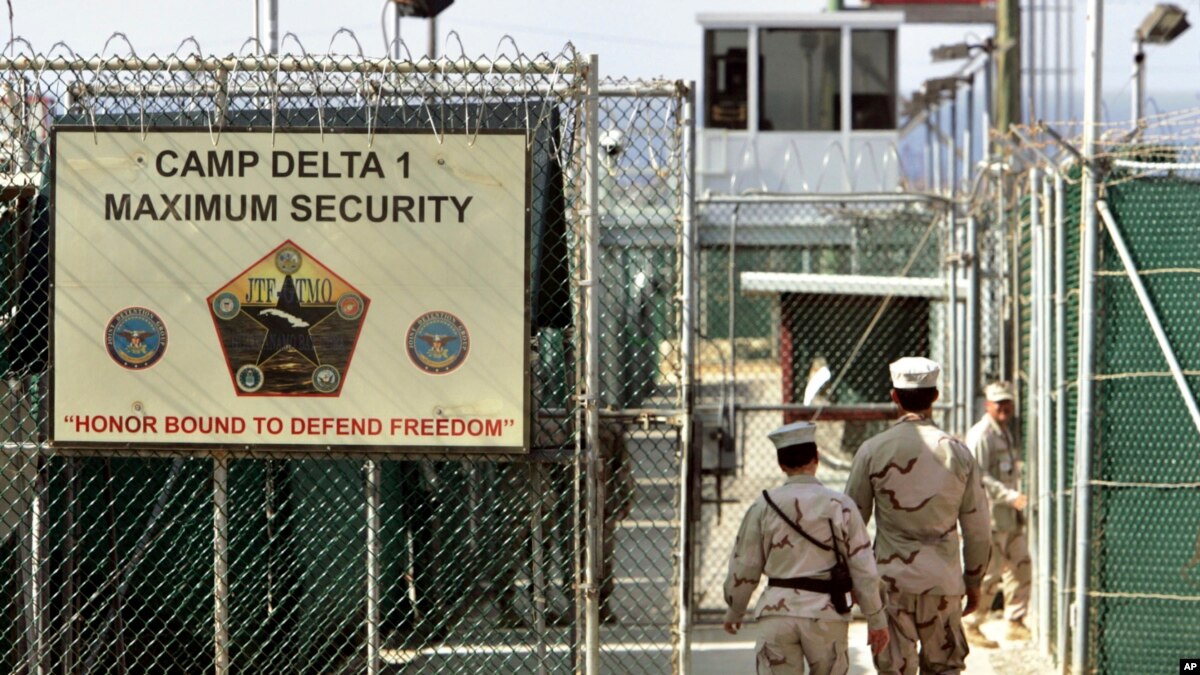
Rights groups are criticizing President Donald Trump's decision to keep the U.S. military prison in Guantanamo Bay, Cuba open.
"I am keeping another promise," Trump said Tuesday in his State of the Union address, having signed an executive order that cancels a 2009 order in which then-President Barack Obama pledged to shutter the facility.
In his speech, Trump said such facilities were crucial in ensuring the U.S. has "all necessary power to detain terrorists" in the fight against the Islamic State and al-Qaida terrorists.
The order maintains the U.S. "may transport additional detainees to U.S. Naval Station Guantanamo Bay when lawful and necessary to protect the nation." The order also directs Defense Secretary Jim Mattis to develop a policy within 90 days on how to handle and transfer "individuals captured in connection with an armed conflict."
For 'bad dudes'
Trump said during his campaign that he wanted to keep Guantanamo open and "load it up with some bad dudes."
Noor Zafar of the Center for Constitutional Rights, a nonprofit legal and educational organization in New York, has helped represent Guantanamo detainees in federal court. She told VOA that Trump's order was "making good on his campaign promises."
"This is a piece of his broader anti-Muslim, Islamophobic rhetoric that he's kind of used to rile up his base," Zafar said Wednesday.
Zafar, who would like to see the base shut down and the detainees either charged or released, said the president's notion of who is designated a terrorist is "very explicitly and very clearly based on a person's religious and ethnic identity."
She pointed to Trump's contrasting reactions to the violence in Las Vegas in August 2017 — when a white man killed dozens and injured hundreds of people attending a music festival — and his response to violence in New York City in October 2017 — when a Muslim man killed eight and injured about a dozen others by plowing a rental truck through a bike and pedestrian path. A note was found at the scene declaring the man's support of Islamic State.
"When it's a white man committing violence, there's no calls for him to be labeled a terrorist. But when it's a brown man or a Muslim man committing acts of violence, he's immediately labeled a terrorist and the president calls on him to be stripped of all of his constitutional rights and sent to Guantanamo," Zafar said.
"I think that shows kind of where President Trump's animus and intentions lie," she added.
'Symbolizes America's descent'
The American Civil Liberties Union said that "in trying to give new life to a prison that symbolizes America's descent into torture and unlawful indefinite detention, Trump will not make this country any safer."
Others welcomed Trump's order to keep Guantanamo open. Republican Senator Lindsay Graham of South Carolina said on a video posted on Twitter: "I thought the president showed a determination as commander in chief to win a war we can't afford to lose — that the days of treating terrorists as common criminals are over. They will now be unlawful enemy combatants."
Republican Senator James Inofe of Oklahoma wrote an opinion piece for Fox News saying that the executive order "clearly showed [Trump's] commitment to fighting terrorism."
"One of the best, most effective counterterrorism tools is maintaining our facilities at Guantanamo Bay," Inhofe said. "These are enemy combatants who want nothing more than to attack America and its people."
Under the Obama administration, Inhofe wrote language in the National Defense Authorization Act that prevented the administration from closing the facility and transferring detainees to the United States.
Opened after 9/11
President George W. Bush opened Guantanamo after the September 11, 2001, terrorist attacks to hold and interrogate suspected enemy combatants.
At the height of its operations, the prison held 780 people, mostly inmates with alleged ties to al-Qaida and the Taliban. Since then, hundreds have been transferred back to their home countries or to other nations that agreed to accept them.
Obama tried unsuccessfully to close the prison during his eight years in office. He sent no new detainees to the facility during his administration and reduced the number of prisoners to 41.
Obama's Justice Department argued that U.S. civilian courts were the best place to try terrorism suspects and cited convictions in New York and other cities as proof. Attorney General Jeff Sessions and other Republicans have argued that the legal protections offered in civilian courts, including the right to remain silent, should not be granted to terrorists.
Of the 41 captives, 10 are charged with war crimes at military war courts. U.S. diplomats have negotiated security agreements to release five of the 41 captives to other countries. These agreements have been approved by review panels, but the State Department has shut down its office that handled those negotiations.
VOA's Michael Bowman contributed to this report.
Read More Rights Groups Criticize Trump's Move to Keep Guantanamo Open : http://ift.tt/2E5QS9g/cloudfront-us-east-1.images.arcpublishing.com/bostonglobe/VNG7YMZTRWJ5WBFTJ5NVETPCQI.jpg)
No comments:
Post a Comment